| Problem viewing/PDA users,
click here. |
 |
|
News from ALPA International |
|
March 26, 2010—In This Issue:
|
|
|
U.S.-EU Open Skies Protocol Maintains Status Quo on Cabotage and Foreign Control of U.S. Airlines |
|
|
|
 The
draft Open Skies protocol initialed by the United States and
the European Union this week did not include language sought
by the European Union to allow cabotage or foreign control
of U.S. airlines, and the agreement underscored the value of
high labor standards. While the protocol has not yet been
ratified, the agreement reflects important progress in
protecting U.S. jobs, but challenges lie ahead for ALPA to
defend pilots and other workers’ interests in connection
with the U.S.-EU air services agreement. The
draft Open Skies protocol initialed by the United States and
the European Union this week did not include language sought
by the European Union to allow cabotage or foreign control
of U.S. airlines, and the agreement underscored the value of
high labor standards. While the protocol has not yet been
ratified, the agreement reflects important progress in
protecting U.S. jobs, but challenges lie ahead for ALPA to
defend pilots and other workers’ interests in connection
with the U.S.-EU air services agreement.
On March 25, the United States and the European Union
initialed a protocol amending the 2007 “first stage” air
transport agreement. Once the protocol enters into force, it
will complete the obligation contained in the first-stage
agreement for the two sides to engage in “second-stage
negotiations” that include the discussion of further
liberalization of traffic rights, wet lease of European
airline aircraft to U.S. airlines on U.S. domestic routes,
and additional foreign investment opportunities.
During the negotiations, the European Union sought the
right for its airlines to carry U.S. cabotage traffic and
conduct domestic wet lease operations on domestic routes, as
well as the elimination of restrictions on foreign
investment in U.S. airlines. The United States did not agree
to any of these requests. The two sides did agree to have
the Joint Committee (the body established to monitor
developments under the agreement) undertake an annual review
of any new developments toward changes in the U.S. ownership
and control rules and to create a process of cooperation,
“including appropriate recommendations to the parties.” Any
actual amendment of the ownership and control rules would be
left to Congress.
(For more information, please click here.)
Return to top
|
|
|
ALPA Pilots Rally on Capitol Hill to Protect Workers in International Airline Alliances |
|
|
ALPA pilots rallied on Capitol Hill this week to
call on members of the U.S. House of Representatives
to support the Aviation Jobs Outsourcing Prevention
Act (H.R. 4788), which directs the Department of
Transportation to ensure that new revenue-sharing
agreements between U.S. and foreign airlines are
beneficial to U.S. airline workers as well as to
their airlines.
Nearly two dozen ALPA members, including pilots from United Airlines,
Continental Airlines, Delta Air Lines, and FedEx, joined Capt. John Prater,
ALPA’s president, to meet with Rep. Tim Bishop (D-N.Y.), who introduced the
legislation.
“Congressman Bishop understands our concerns that good jobs are being sent
overseas,” said Prater in introducing Rep. Bishop. In his remarks, Rep. Bishop
acknowledged the critical support of Rep. Mike Michaud (D-Maine), and Rep.
Thaddeus McCotter (R-Mich.) for cosponsoring the bipartisan bill. Rep. Bishop
told the pilots gathered that the legislation now has more than 13 cosponsors
from both sides of the aisle.
(For more information, please click here.)
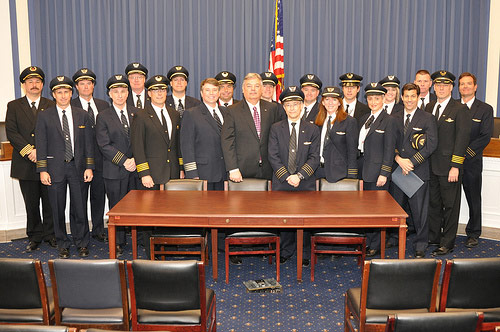
Return to top
|
|
|
Alaska Recalls Furloughed Pilots |
|
|
Alaska Airlines management this week mailed recall notices to a dozen of the 106
Alaska pilots on furlough. Additionally, one of the four pilots who elected to
participate in the voluntary furlough program negotiated last year to mitigate
furloughs will return, which means a total of 13 pilots will return to active
service.
To facilitate the recalls, the Alaska MEC and the company on Tuesday agreed
on a memorandum of understanding (MOU) that codifies how recalls are to occur,
as outlined in the pilots’ contract and the agreements that created the furlough
mitigation programs approved last year. The new MOU does not change any of the
pilots’ contract language, but rather collects all of the furlough recall
provisions into an easy-to-use “checklist” for recalls.
“We are pleased that the recall process has begun,” said Alaska MEC vice
chairman F/O Paul Stuart. “At the same time, the Alaska MEC has not forgotten
that 94 of our fellow pilots remain involuntarily furloughed. We will continue
to work to represent the interests of all of our pilots, including those who are
not currently on active status, and look forward to the day when all of our
pilots receive recall notices.”
The recalls become effective May 1, one month prior to the opening of a new
Alaska Airlines base in Portland.
Return to top
|
|
|
Delta Connection Pilots Compare Notes |
|
|
Members of the Delta Connection Pilots Alliance (DCPA),
along with their full MECs, met this week in
Orlando. Modeled in part on the SkyTeam Pilots
Alliance, the DCPA is the first alliance of its kind
among Delta-affiliated carriers represented by ALPA.
DCPA builds upon a relationship of mutual trust,
collaboration, and cooperation among carriers under
the Delta brand to improve safety, security, and
training standards at alliance airlines.
“Improving these elements and bringing them to a
common standard is a crucial goal that will enhance
our long-term career prospects and strengthen the
Delta brand,” said DCPA chairman Capt. Dave
Nieuwenhuis (ASA). “The alliance provides us with a
collaborative environment to cultivate industry best
practices at each airline so that we are in a
position to share in the success of the Delta
brand.”
DCPA currently consists of MECs representing the
pilots from four ALPA Delta Connection partners:
Atlantic Southeast, Comair, Mesaba, and Pinnacle.
Compass representatives also participated, and other
ALPA-represented Delta Connection carriers may
eventually become participants as well.
(For more information, please click here.)
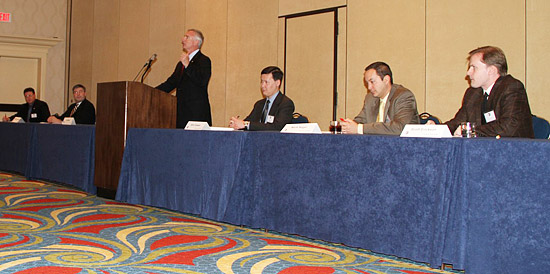
Pictured left to right: Dave
Nieuwenhuis (ASA), Matt Lamparter (Comair), Lee Moak
(Delta), Eric Cowan
(Compass), Mark Nagel (Mesaba), Scott Erickcon
(Pinnacle).
Return to top
|
|
|
ALPA Pilots Elected to IFALPA Posts |
|
 Several
prominent ALPA pilot leaders were elected to offices
of the International Federation of Air Line Pilots’
Associations (IFALPA) during its 65th annual
conference in Marrakech, Morocco, this week. Several
prominent ALPA pilot leaders were elected to offices
of the International Federation of Air Line Pilots’
Associations (IFALPA) during its 65th annual
conference in Marrakech, Morocco, this week.
ALPA executive administrator Capt. Don Wykoff (DAL)
was elected IFALPA deputy president. In this
capacity, he will serve as a member of the
Federation’s Executive Committee and Executive
Board, which are charged with implementing the
organization’s safety and industrial policies.
Wykoff replaces Capt. Paul Rice (UAL), who also
serves as ALPA’s first vice-president. Rice
completed his term and opted not to run again.
In other IFALPA officer elections, ALPA Canada
Board president Capt. Dan Adamus (ACJ) was reelected
executive vice-president of the North America Region
(NAM), and Capt. Greg Wolfsheimer (DAL) was
reelected the regional vice president–U.S. Central
Pacific.
F/O Mark Rogers (UAL), director of ALPA’s
Dangerous Goods Program, was elected chairman of the
IFALPA Dangerous Goods Committee. Capt. Robert “Rip”
Torn (DAL), who chairs ALPA’s Air Traffic Services
Group, is the new chairman of the Federation’s Air
Traffic Services Committee, and Jazz Air MEC vice
chairman Capt. Rod Lypchuk is IFALPA’s new chair of
the Administration and Finance Committee.
IFALPA represents more than 100,000 airline
pilots at more than 100 member associations,
including ALPA, from around the world. The
Federation’s mission is to be the global voice for
airline pilots.
Return to top
|
|
|
AirTran Pilots to Conduct Strike Authorization Ballot |
|
|
ALPA’s AirTran pilot leadership has authorized a
strike authorization vote to be conducted beginning
April 19. Members of the AirTran MEC met last week
to assess the status of contract negotiations. After
lengthy discussion, they passed a resolution
initiating this special membership ballot.
“Details of the vote and the corresponding
timelines are being circulated to our pilots,” said
AirTran MEC Chairman Linden Hillman. “After nearly
six years of collective bargaining—at a time when
our airline is posting substantial profits—we need
to do something to jumpstart these contract talks.”
A strike authorization ballot, if ratified by
AirTran pilots, provides the MEC with the discretion
to declare a strike, when and if the proper
circumstances support such a decision. The Railway
Labor Act, the legal framework for the contract
talks, outlines a step-by-step process with a series
of requirements that must be accomplished before
labor or management can conduct self-help.
(For more information, please click here.)
Return to top
|
|
|
Delta Pilots Contribute $150,000 to Hospital |
|
|
The Delta Pilots’ Charitable Fund (DPCF) has donated $150,000 to equip a
playroom in the Congenital Heart Unit of the Arnold Palmer Hospital for Children
in Orlando, Fla. The donation will provide for a fully outfitted play area in
this state-of-the-art health-care facility. The DPCF, the first and only
charitable fund established, managed, and funded entirely by pilots of a major
U.S. airline, was formed in 1999.
The DPCF Board, the Delta Master Executive Council, and visiting Delta
Connection pilots visited the hospital Wednesday evening, distributing stuffed
“pilot” bears to children. The check will be presented to Arnold Palmer at the
Bay Hill Invitational Tournament this Saturday.
“In our profession we regularly deal with stress and critical decisions, but
I do not have adequate words to describe the stress that childhood illness
brings to children and their loved ones,” said Capt. Lee Moak, chairman of the
Delta MEC. “I hope that our donation can provide a few moments of joy during the
anxious days of a child’s hospital stay. It is truly an honor for the Delta
Pilots Charitable Fund, on behalf of the Delta pilots, to make this donation to
the Arnold Palmer Hospital for Children.”

Delta pilots donate $150,000 to Arnold Palmer Hospital for
Children.
Return to top
|
|
|
NSC Reps Continue Work on Secondary Barrier Standards |
|
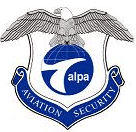 ALPA
security representatives participated in the fifth RTCA Special Committee 221
Plenary Meeting in Washington, D.C., March 16–17. SC-221 is charged with
establishing performance standards for secondary barriers in commercial aircraft
to supplement the protections provided by the fortified flight deck door. ALPA
security representatives participated in the fifth RTCA Special Committee 221
Plenary Meeting in Washington, D.C., March 16–17. SC-221 is charged with
establishing performance standards for secondary barriers in commercial aircraft
to supplement the protections provided by the fortified flight deck door.
The plenary received updates from the Alternate Methods working group,
including discussions about the use of closed-circuit video cameras as a
supplement to the secondary barrier system, and also undertook in-depth dialogue
regarding the establishment of procedures for handling Sensitive Security
Information (SSI). Future participation in SC-221 will require members to
complete a nondisclosure agreement due to the sensitive nature of its
deliberations.
Additionally, committee co-chairman Capt. Ed Folsom (UAL) reported on the
SC-221 December leadership meeting held in Denver, Colo., and introduced
propositions resulting from that meeting, which were further discussed and
defined by the plenary group.
Future committee work will include continued evaluation of alternative
methods to protect the flight deck and other associated human factors issues,
such as crewmember reaction times to perceived threats. The next SC-221 plenary
is scheduled for mid-June 2010 in Washington, D.C.
Return to top
|
|
|
ALPA Hosts CrewPASS Consortium Meeting |
|
 ALPA
facilitated a second meeting at its Herndon Conference Center yesterday of the
airline and MEC consortium, which is advancing the Crew Personnel Advanced
Screening System (CrewPASS). Three IT service providers presented their views of
how best to implement CrewPASS to the consortium, which is comprised of several
airlines, MEC pilot representatives, the Transportation Security Administration
(TSA), and ALPA staff. ALPA
facilitated a second meeting at its Herndon Conference Center yesterday of the
airline and MEC consortium, which is advancing the Crew Personnel Advanced
Screening System (CrewPASS). Three IT service providers presented their views of
how best to implement CrewPASS to the consortium, which is comprised of several
airlines, MEC pilot representatives, the Transportation Security Administration
(TSA), and ALPA staff.
ALPA has drafted technical and operating standards for CrewPASS, which are
intended to be presented next week to the TSA for the agency’s approval. Once
that document is approved, the consortium airlines will have the documentation
they need to begin soliciting requests for CrewPASS implementation bids. Stay
tuned for more information.
Return to top
|
|
|
FAA Publishes Oxygen Mask Petition |
|
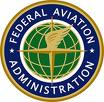 The
FAA recently published a petition for exemption from the requirement for one
pilot to don an oxygen mask above FL250 when the other pilot leaves his station
at the controls of the airplane. The exemption would have the remaining pilot
place the mask in his or her lap while the other pilot is absent. The
FAA recently published a petition for exemption from the requirement for one
pilot to don an oxygen mask above FL250 when the other pilot leaves his station
at the controls of the airplane. The exemption would have the remaining pilot
place the mask in his or her lap while the other pilot is absent.
The primary reason for the petition is to prevent the spread of transmissible
disease among pilots who have to don the masks on a routine basis. Oxygen masks
are a potential breeding ground for disease and cannot be adequately cleaned.
The ALPA Aeromedical Committee responded in favor of the petition.
Click here to read the Association’s comments.
Return to top
|
|
|
Lobbying for Additional FFDO Funding |
|
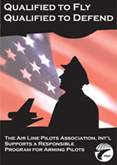 This
week, ALPA president Capt. John Prater met with U.S. House Homeland Security
Appropriations Subcommittee chairman Rep. David Price (D-N.C.) to discuss the
Federal Flight Deck Officer Program (FFDO). Prater impressed upon the
congressman the need for additional funding to continue and expand FFDO’s
mission. Price expressed his deep appreciation for the dedication ALPA FFDO
volunteers routinely provide to our country. This
week, ALPA president Capt. John Prater met with U.S. House Homeland Security
Appropriations Subcommittee chairman Rep. David Price (D-N.C.) to discuss the
Federal Flight Deck Officer Program (FFDO). Prater impressed upon the
congressman the need for additional funding to continue and expand FFDO’s
mission. Price expressed his deep appreciation for the dedication ALPA FFDO
volunteers routinely provide to our country.
Accompanying Prater was staff from ALPA’s Engineering and Air Safety and
Government Affairs Departments.
Click here to read a letter Prater sent to Price about what the Association
is asking for in FFDO funding.
Return to top
|
|
|
ALPA Meets with ERAU Officials |
|
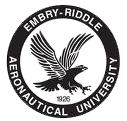 Representatives
of ALPA’s Engineering & Air Safety Department met with representatives from
Embry-Riddle Aeronautical University this week to discuss the status of airline
pilot certification improvements, which are being promoted by Congress and
discussed by the FAA. Representatives
of ALPA’s Engineering & Air Safety Department met with representatives from
Embry-Riddle Aeronautical University this week to discuss the status of airline
pilot certification improvements, which are being promoted by Congress and
discussed by the FAA.
ALPA also participated in the university’s Council for Aerospace Safety and
Security Education (CASE) meeting, which is normally held twice each year. The
CASE, comprised of numerous government and industry aviation experts, advises
the university on areas of education, legislation, training, research,
personnel, facilities, and equipment.
Return to top
|
|
|
This Week’s ALPA Press Releases |
|
|
|
|
|
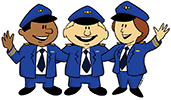
ALPA president Capt. Dave Behncke was elected the first president of the
International Federation of Air Line Pilots’ Associations (IFALPA) in 1948. ALPA
president Capt. Clancy Sayen was IFALPA’s longest-serving president, holding
office from 1952 to 1964. Capt. Rob McInnis was the IFALPA president in 1997,
when the Canadian Air Line Pilots Association merged with ALPA. Most recently,
ALPA first vice-president Capt. Dennis Dolan was elected IFALPA president in
2003, holding office for two two-year terms.
Return to top
|
|
|
Feedback & E-mail Address Changes |
|
| Questions or comments on this FastRead? Give us your feedback at
communications@alpa.org. If you have moved or changed your ISP or e-mail
address, please update your ALPA records. If you don’t, you
will no longer receive the ALPA FastRead and other e-mail bulletins and notices,
and once your postal forwarding order expires, you’ll no longer receive the
magazine and other ALPA mail. You can do it yourself by going to
https://crewroom.alpa.org and logging
in. Go to “My ALPA” on the left side of the page, and from there, you’ll be
instructed how to make the necessary changes. If you don’t have access to
https://crewroom.alpa.org, you can
e-mail your requests by sending them to
membership@alpa.org. Be sure to include your member number or enough other
information so that we can identify you in the membership database, and tell us
what information needs to be updated. Please note that it is not sufficient
just to notify your LEC or MEC of these changes—you should register them with
the ALPA Membership Department in Herndon. Can’t remember your member number
or how to log in? Need information about your ALPA insurance programs? These and
other questions about ALPA services can be answered by contacting
membership@alpa.org. Return to top
|
|
|
Air Line Pilots Association, Int’l
1625 Massachusetts Avenue NW
| Washington, DC 20036 | 703-689-2270 |
|
 |

